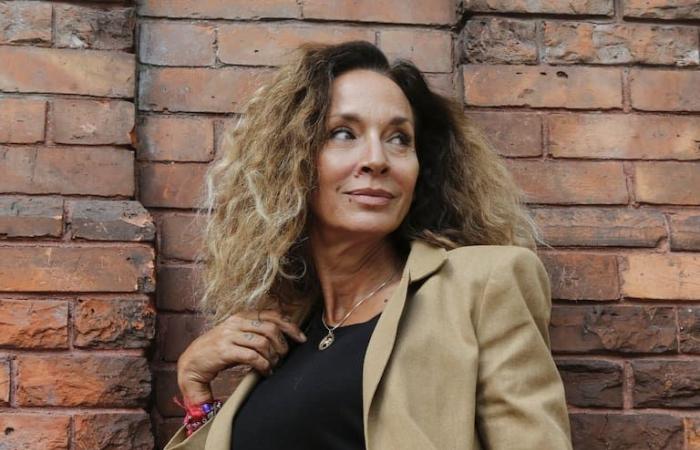Hear
Little by little he began to speak publicly about his depression, his suicide attempts, and how he had managed to get out of there. Ana Paula Dutil She never imagined that this condition would lead her to help others who were going through the same thing. She first dared to tell it on the podcast The girls say, which he hosts with Julieta and Rosario Ortega and Fernanda Cohen. Then she spoke in THE M and they immediately summoned her to sit at the table with Juana Viale. There, while she was recounting what the moment had been like when she took pills with alcohol and how they managed to rescue her from her and then ended up hospitalized, she was seen by the deputy of Together for Change. Sabrina Ajmechet. It was she who suggested that they do something together to spread problems related to mental health.
-What is the name of the project?
-I called him Let’s talk, because just after having told about my depression, what I suffered a few years ago, many people wrote to me, obviously, telling me what they were going through and telling me that they did not have access to professionals. My psychiatrist, my therapist, helped me, but not everyone has that possibility. So, that day Sabrina approached, we started talking and she told me: “I want to give you a hand.”
-Do you know why he brought up the subject?
-Everyone somewhere is affected by this issue of depression and this is how they approach it. To her too, not to her in the first person, but to a family member. And she got a meeting with Maria Eugenia Vidalwho also suffered from depression, so she is very involved in that.
-They met?
-Yes, he received us. We were both, divine, I told her what was happening, that I thought it was good that there was a space where people could listen or listen to each other. They told me that these meetings cannot be therapeutic, but they can be informative, orientation talks, where to go, who to turn to, all the places that are free; Obviously the talk is also free. A meeting where you can psychoeducate, talk about suicide. We have to talk about mental health. María Eugenia put us in contact with the Dr. Juan José Fernández, who is the president of the Psychiatric Association for Suicide Care.
-Do you know why you had depression?
-The pandemic was devastating, we all know that, I am not saying anything new. But it also comes from before. My mother suffered from depression, I knew it when I grew up. And it wasn’t talked about in my family. When my episode happened, the subject was not discussed openly either.
-At that moment were you afraid that it would transcend?
-Look, when it happened everything was kept, it was a secret because no one wanted it to be known. I didn’t know, I was like in a cloud, that is, I didn’t care about any of that, I didn’t think about it, but I did experience it as “this is not talked about”; Even I thought about it that way.
-Of course, it happened to you too.
-Total, total. And when I told it in The girls saywhere I forgot that there were cameras and I relaxed because I was talking with friends, I understood how healthy it is to talk.
-How did you get excited? Beyond feeling relaxed among friends, there was a decision.
-What happened was that when we got together to do that program, we all said: “Well, we have to talk about issues that concern us” and each of us had her time to think about what she would like to talk about. I don’t know what happened to me that I said: “I want to talk about depression.” Before it was recorded, I spoke with my children, with all four of them, and I told them: “I’m going to talk about this topic,” I told them about the project and everything. It was the only ones I spoke to and they told me: “Go ahead.” I needed to listen to them. If they told me: “No, mom, don’t do this,” I wouldn’t do it. And well, my friends also supported me, they loved the topic. It was like that, I didn’t think too much about what could come next. I only consulted with my children, they gave me the ok and I went ahead.
-What you say about your children is important, because there are people who don’t tell it, precisely because of them.
-I think the important thing is to be able to talk about this. And my children were very loving to me, even with the pain I caused them. They still feel it, huh? And some of them are angry because a wound was left. But I understand that, that you have to do a process. When we talk about it, I tell them to work so that this does not remain inside them, that this is not a problem in the future. Because, well, her mother made a mistake, she made a bad decision and she has to bear that. Luckily I’m here today, I’m grateful, it’s a second chance.
-There is a stigma in mental health, but ultimately it is an illness, like any other.
-Exactly, it is a disease. As I say in the program’s monologue, it is a disease that is born in the brain and spreads throughout your body, because it takes over your body, it takes away your desire to live, your will, your empathy. And, in my case, I became a serial liar.
-What does the project provide to people who have this disease? Let’s talk?
-Let them know where to go. This is very important, not only for the sick but also for the environment. So, in this case, my children could go and listen to professionals, because they can give you information or guidance on how to accompany, which is important not to abandon. Because the environment gets frustrated, she says: “Enough, I’m not doing anything else with this person.” And you have to be there. You have to be there even if the other refuses, it is very important. In the talks they will be given tools for all these things.
-Are you going to be there?
-Yes, whenever I can. They will be every fifteen days, They start in July, at the City University, Paseo Colón 255. I want to be there because for me that is also part of my process: transform my pain into service. It’s something very small what I’m doing. Luckily I ran into Sabrina, then María Eugenia and my therapist who is also involved in this came, Gisela Sztainberg Klein. She is like the head of the whole group. Then there is a licensed specialist in adolescents, Alexander Covalsky and another one called Guido Liguri. They are the ones who are going to be leading the group and giving all this information, education, psychoeducation, everything that I already told you.
-When something like this appears in a family, everyone asks “where do I start?”
-Of course, here we are going to guide you. We are going to give all the necessary information, all the free places that exist where you can go; what professionals, the hospitals that work and everything that has to do with the environmental process as well: how to accompany these situations, where to go when your mother makes a comment, such as that she does not want to live or any other symptoms that she may have. . And those symptoms, be clear about them.
-Has something like this never been done?
-No, and we will improve it as it happens. I hope that people will be encouraged to go and that it will be replicated throughout the country, that they will continue doing it, because people from the interior write to me saying that they don’t know what to do, that they don’t know where to go. There is a lot of work to be done there.
-Then it’s not Alcoholics Anonymous type.
-No no. You can’t do that because if I, Anita, go to that group and open my things at that moment, later I leave with all that there. That type of therapy has to be one on one. In a group things can be left open that it is not good to carry them that way, it is dangerous. So, the idea is to guide people where to go and ask themselves all the questions, everything they need to know, but it is not therapy, you cannot do that. It’s a lot of responsibility.
-Are you planning to say something?
-I am more about the flow, about what happens there. Always speaking from my experience, I would say everything that adds up, absolutely. But I didn’t prepare anything. The simpler it is, the better. It’s good to see that the same things happen to others as you do and that you are not the only one who is like this, because you don’t feel so alone. That’s what happens in AA and NA groups, but unfortunately we can’t do that.
-Did it also cost you to start treatment?
-I had been without a diagnosis for years, I was misdiagnosed. At one point they said I was bipolar, but that had nothing to do with me. I had several psychiatrists and one day, a friend -one of the few who remained when I was really bad- said: “You know what, why don’t you go see this psychiatrist? They recommended her to me and she’s very good.” She was the wife of a friend of his. And then I don’t know what happened to me, it was the first time I said: “Okay, I’m going to do something they tell me. I’m going to listen to them.” That was the first little step. I wrote to this woman and went to see her. That happens to me with people too. The other day someone wrote to me on Instagram saying “it was really good for me to listen to you” and thanks to that they started. These are little things we do that we don’t realize but that’s the first step. It’s very small.
-Everything is very informal. There are no official campaigns…
-I’m not going to get involved in saying things about the Government or what the Government thinks, I’m not interested. But what I can say is that researching all this, I realized that there is a 0800 number for suicide care that stops working at seven in the afternoon. These are things that have to be changed, modified. A lot needs to be modified! María Eugenia Vidal put me in contact with Marina, Chano’s mother, because what I wanted was to see how a group worked and what she wants to do seems gross to me. She told me a little about it, I talked to her. It is also a group of people who came together to give information and to accompany the sick.
-Did she give you any advice?
-She was one of the first who spoke to me about being careful about forming groups, because that was my idea, how deluded I am. It was to make a group as if it were Alcoholics Anonymous and Narcotics Anonymous, where we all talk and do well and things like that, that’s very much me. And she told me: “No, no, that is impossible, it cannot be done.” And that’s when I started researching with professionals and they all said exactly the same thing as her.
-How are you now?
-Very good, the truth is that I am very happy. I can’t ask for more, more than to thank you. I have work, I have health. My children are fine, although all this sounds like a cliché, it is the truth. I’m fine. Living in the present and grateful. That is the most important.
-And you want to help…
-Because at one point I said: “Why tell something like that if there isn’t something good after that?” And I did it.






